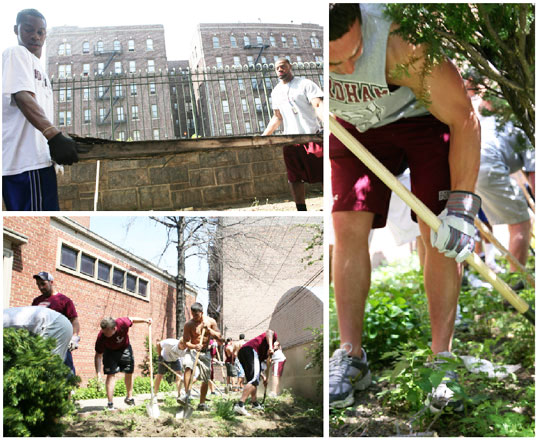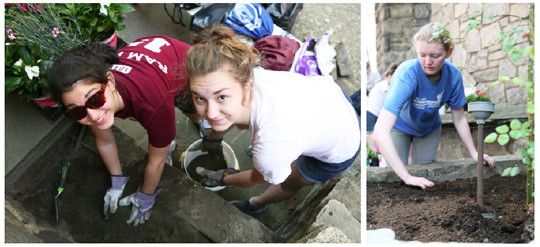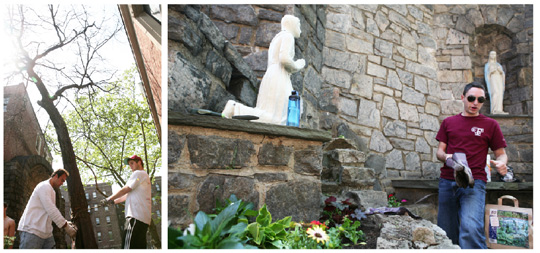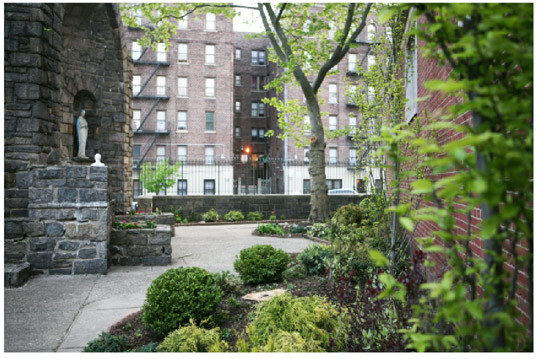
• At Lincoln Center on Monday, Sept. 9, from 12:30 to 1:30 p.m. in the Plaza View Room;
• At Westchester on Wednesday, Sept. 11 from 12:30 p.m. to 1:30 p.m. in room 133; and
• At Rose Hill on Friday, Sept. 13 from 12:30 to 1:30 p.m. in the St. Ignatius Room, University Church.
From a stark, secluded cave just outside Manresa, Spain, a young Íñigo de Loyola came upon the surefire path to God:
30 days of systematic prayer and meditation designed to reveal God’s presence in all things.
But in the interest of leading even the busiest believers to God, the future founder of the Jesuits penned another version of his Spiritual Exercises, so that men and women of all ages could have the opportunity to develop their spiritual lives.
This month, Fordham’s Campus Ministry will begin accepting applications to its Spiritual Exercises in Everyday Living (SEEL) retreat, based on St. Ignatius’ adapted version of the Spiritual Exercises. Offered annually, SEEL allows faculty and staff to undergo a 30-week experience of spiritual direction and prayerful study tailored to fit the busy lives of Fordham employees.
“It’s a very individualized journey,” said Carol Gibney, associate director for Campus Ministry at Lincoln Center and director of Ignatian programs.
“Many people come with a life question, whether about work, family, or what to do with their time and energy, and others just want a more tangible relationship with God.”
The SEEL retreat incorporates the main themes of the Spiritual Exercises into the workweek by extending them over the academic year. Those interested can attend an information session later this month and then fill out a brief application. Once accepted, each participant will be paired with a spiritual director, with whom he or she will meet weekly. The group as a whole also meets monthly for lunch and a discussion on some aspect of the exercises. Outside of these meetings, participants devote 30 minutes to an hour each day to reflect on a Scripture passage or on commentary from St. Ignatius.
“The world we live in is always moving forward, so it’s important to pause and reflect on where we’ve come from,” Gibney said. “That’s one of the gifts of Jesuit education and the Spiritual Exercises—the praxis of reflection.”
Over the centuries, the Spiritual Exercises have come to be regarded as a way to help individuals contemplate major life decisions. However, the basic intent of the exercises is simply to grow closer with God, said Philip Florio, S.J., assistant vice president for Campus Ministry.
“The exercises are a manual of St. Ignatius’ own prayer experience at Manresa,” Father Florio said. “They are a systematic approach to prayer using Scripture, meditation, and contemplation about the life of Christ… the goal of which is greater communion with God and the world around you.”
Of course, this deeper relationship with God can indeed help those facing a life decision—in Ignatian terms, a process known as discernment—said Father Florio, because reflecting on and becoming more attuned to the essence of God will naturally help one to reach a thoughtful decision.
Aside from their usefulness, the importance of the Spiritual Exercises to the Jesuit tradition cannot be understated, Father Florio added.
“They are an inspiration for the entire Jesuit way of proceeding—an inspiration for the Jesuit spirituality and method of education, which is to draw one closer to God.”
Marc Canton, director of University transportation, cited that aspect of the Spiritual Exercises as a reason why the SEEL experience is especially beneficial to Fordham employees.
“You not only benefit from it personally, but it also helps to align you with the Jesuit way, which makes everything we’re asked to do in our jobs make more sense,” he said.
For Canton, the decision to join SEEL in 2009 stemmed from both personal and professional reasons. He was juggling responsibilities as a newly appointed administrator and simultaneously dealing with his father’s illness.
“I wanted to make sense of the things going on in a way that was positive and could make an impact on the world,” Canton said. “I was also having trouble discerning what God wanted me to do with my life, which is a big part of what the Spiritual Exercises are all about.”
He admitted that it was tempting at first to let his various work commitments take priority over the daily reflections. But eventually, he came to realize that the times when his motivation was lowest were the times that he most benefited from meeting with his spiritual director.
And in the end, although he did not get the answers he might have wanted, the experience helped him surmount his difficulties.
“I realized that it’s okay to not know the answers, and to trust that God will take care of me,” Canton said. “I learned to live in the right-here and right-now, because that is all you have.”
In May, Patrick Holt, assistant dean of the Graduate School of Religion and Religious Education, completed the most recent installment of the SEEL retreat. Holt was no stranger to Ignatian spirituality, having graduated from St. Joseph’s University in Philadelphia and completed a 10-day version of the Spiritual Exercises some 15 years ago.
“For me, it was a matter of reconnecting with my first experience. I had had a busy 15 years of working and having four children, so this was an opportunity to go back and renew,” Holt said.
A prime difference between his first experience of the exercises and the SEEL retreat, Holt said, was the monthly group meetings.
“It was a powerful part of the experience to meet with fellow employees—people living similar lives, working at the University, and integrating the ideals together,” he said.
Information sessions about the upcoming cohort of SEEL will be offered:
• At Lincoln Center on Monday, Sept. 9, from 12:30 to 1:30 p.m. in the Plaza View Room;
• At Westchester on Wednesday, Sept. 11 from 12:30 p.m. to 1:30 p.m. in room 133; and
• At Rose Hill on Friday, Sept. 13 from 12:30 to 1:30 p.m. in the St. Ignatius Room, University Church.
 Fordham’s Office of Campus Ministry kicked off its new Pedro Arrupe Faith and Justice program on Saturday, April 20 with a joint service project with the men’s football team.
Fordham’s Office of Campus Ministry kicked off its new Pedro Arrupe Faith and Justice program on Saturday, April 20 with a joint service project with the men’s football team.
Team members and other volunteers dug up, ripped out and emptied a lot choked with overgrown weeds, shrubs and trees next to a convent at St. Martin of Tours church in Belmont. With the help of donations from the Fordham Jesuit community, Emerald Tree Care Company, Frank Bulfamante & Sons, and Ferrara Brothers, the volunteers transformed the space into a tranquil prayer garden open to the whole community.
Photos By Tom Stoelker ]]>
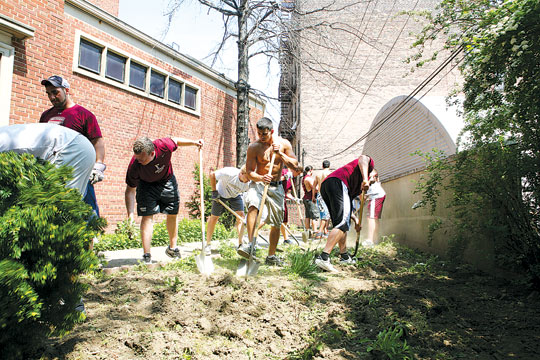
Fordham’s Office of Campus Ministry kicked off its new Pedro Arrupe Faith and Justice program on Saturday, April 20 with a joint service project with the men’s football team.
Team members and other volunteers dug up, ripped out and emptied a lot choked with overgrown weeds, shrubs and trees next to a convent at St. Martin of Tours church in Belmont. With the help of donations from the Fordham Jesuit community, Emerald Tree Care Company, Frank Bulfamante & Sons, and Ferrara Brothers, the volunteers transformed the space into a tranquil prayer garden open to the whole community.
For more photos of the clean-up CLICK HERE.
]]>Thanksgiving Food Drive – November 10 through 21
Local food pantries are struggling to meet the needs of their clients, particularly during the holiday season. If you would prefer to make a monetary donation, please make checks out to “Campus Ministry.”
Non-perishable food items and checks may be brought to:
ROSE HILL: McGinley Center 101 or 102
LINCOLN CENTER: Lowenstein 217
Winter Clothing Drive – December 1 through 19
As the weather gets colder, we will begin to collect warm winter clothing in good condition to be distributed through our community partners. If you would prefer to make a monetary donation, please make checks out to “Campus Ministry.”
Coats, sweatshirts, scarves, gloves, sweaters, and socks, as well as checks may be brought to:
ROSE HILL: McGinley Center 102
LINCOLN CENTER: Lowenstein Plaza (bins at the top of the escalator)
For more information, please contact
CAMPUS MINISTRY
Rose Hill: 718-817-4501 or [email protected]
Lincoln Center: 212-636-6267 or [email protected]
COMMUNITY SERVICE PROGRAM
Rose Hill: 718-817-4510 or [email protected]
Lincoln Center: 212-636-7464 or [email protected]
We thank you on behalf of our community partners and neighbors for your generosity.
]]>Father Stroud was born on Oct. 14, 1929 in Brooklyn, N.Y., and entered the Society of Jesus on Sept. 7, 1948 at St. Andrew on Hudson, Poughkeepsie, N.Y.
He worked in the Office of Campus Ministry at Fordham for many years. Previously, he taught at Loyola Marymount University in Los Angeles for nine years, where he applied the spiritual principles of Anthony de Mello, S.J., in his courses to enhance students’ experiences of film and television.
George McCauley, S.J., a classmate of Fr. Stroud, recalls that Father Stroud embraced DeMello’s spirituality in part because he thought it could throw light on Ignatian spirituality as it was traditionally presented. “DeMello was, after all, a Jesuit,” said Father McCauley. “It certainly drew an audience.”
Gloria Messemer, Father Stroud’s long-time assistant at the DeMello Spirituality Center, attests that correspondence and phone calls to the Center all seemed to begin with, “Thank you! Thank you! Thank you!”
Father Stroud is the author of Praying Naked: The Spirituality of Anthony de Mello (Random House, 2005). He helped de Mello with his lectures, seminars and books, and dedicated himself to keeping de Mello’s teachings alive.
Arrangements for Father Stroud are as follows:
WAKE: Tues., July 1
Loyola Hall
Fordham University
Bronx, N.Y. 10458-9993
3 to 5 p.m.
7 to 9 p.m.
MASS OF CHRISTIAN BURIAL:
Wed., July 2
Fordham University Church
Bronx, N.Y. 10458
10:30 a.m.
BURIAL: Jesuit Cemetery
Auriesville, N.Y.
Notes of condolence may be sent to Father Stroud’s brother:
Mr. J. Edward Stroud
420 Spangle Drive
N. Babylon, N.Y. 11703
“This is the second time in the past three years that Fordham’s Global Outreach program has been recognized nationally as a model service and immersion experience for university students,” said Joseph Currie, S.J., director of the University’s Office of Campus Ministry. “Respecting and appreciating the way other peoples and cultures live is often an eye-opening experience and, we believe, an increasingly essential part of any education in the 21st century.”
Global Outreach, a volunteer program comprised of more than 250 Fordham students and alumni, received one of seven national awards presented by the Catholic Campus Ministry Association (CCMA), National Association of Diocesan Directors of Campus Ministry (NADDCM) and the National Catholic Student Coalition (NCSC).
The 2005 honorees were chosen from a pool of winners from the past six years. Fordham’s Global Outreach program first received a national award in 2002.
“We are extremely grateful and humbled to be recognized by the CCMA, NADDCM and NCSC,“ said Michael Kravatz, coordinator of the Global Outreach program. “For the past 16 years, thousands of Fordham students have traveled throughout our country and beyond to encounter the unjust realities that exist throughout our world. In forming relationships with the poor, the hungry and the oppressed, Global Outreach participants are opened to the possibilities of change within themselves and around the world.”
Global Outreach, modeled on the Jesuit tradition of service and the importance of working toward social justice for all people, offers more than 27 projects a year. Its mission is exemplified by those who serve a variety of communities around the country and abroad. This year, students have worked in Tennessee and Mississippi, and undertaken missions in India, Mexico, Guatemala and Thailand.
]]>
